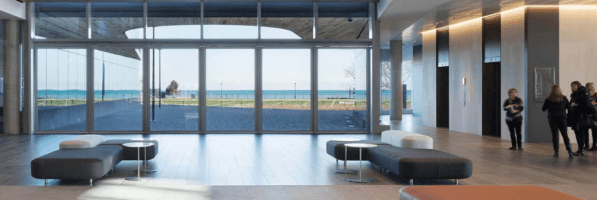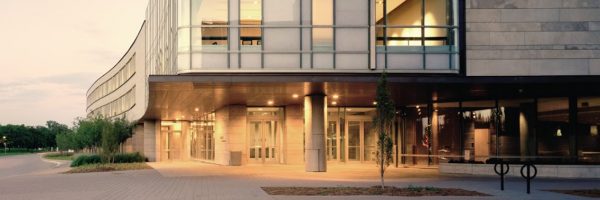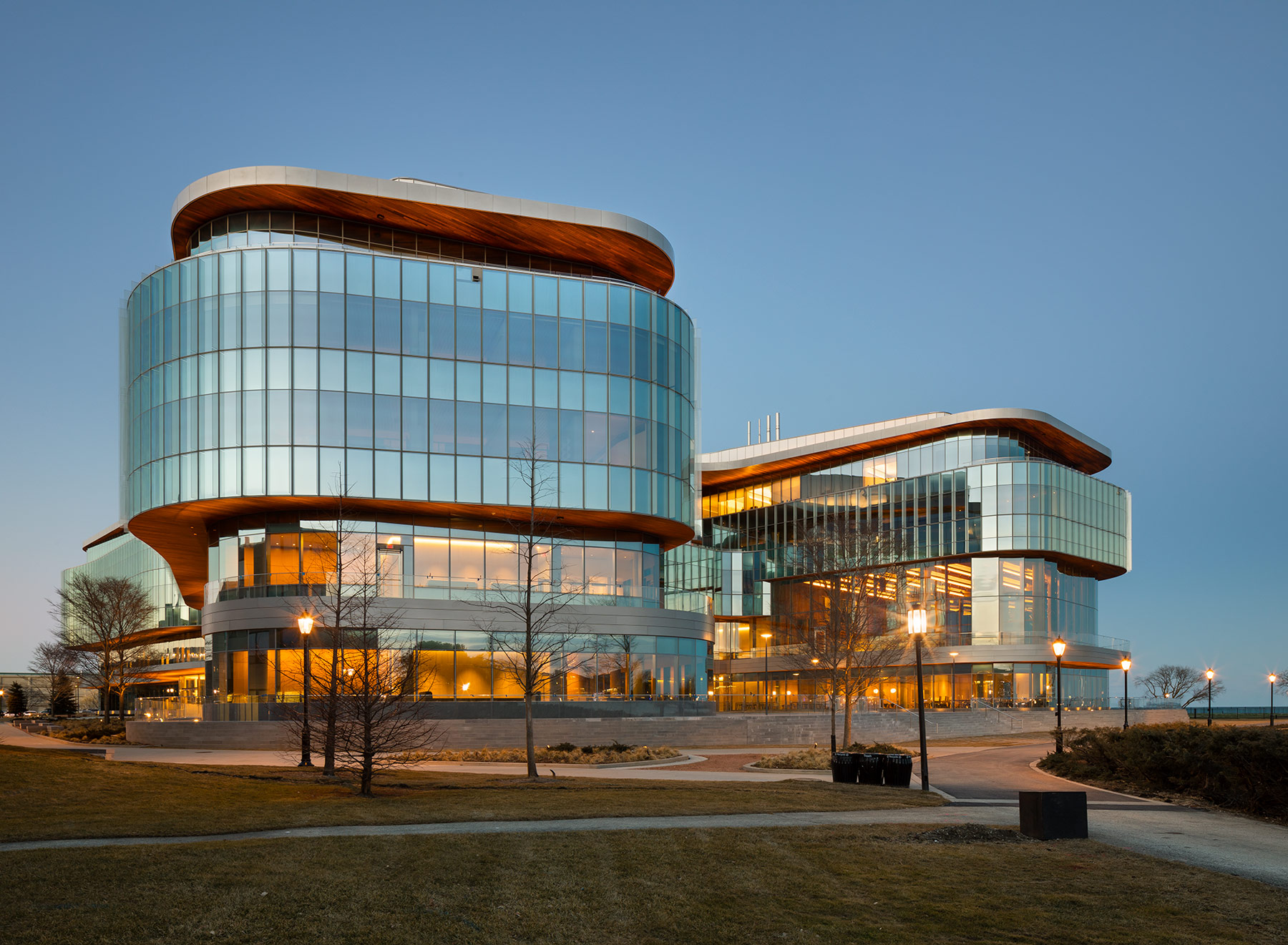Kellogg Launches ‘Ask an Admissions Officer’ Initiative on Social Media

Are you curious about the Northwestern University Kellogg admissions process? Do you want to know if it’s better to apply in one round or another, what the committee is looking for, or how you can apply to more than one program at a time? Kellogg’s new social media initiative, “Ask an Admissions Officer,” offers answers to these burning questions and more.
“Simply put, we are giving people an opportunity to send us questions via Instagram direct message (DM),” explains Kellogg Communication Specialist Rebecca Rogalski.
“Then, our social team is going to collect the best and most frequently asked questions, creating a short series of videos with the Kellogg admissions officers answering those questions.”
Kellogg applicants who want to submit their questions over the next week should do the following:
- Follow @KelloggSchool on Instagram.
- Send the school a question via direct message.
- Check back in early August to see if your question was answered.

This is an ideal opportunity for Kellogg hopefuls to get answers to all their burning questions before the Round 1 deadline on September 19, 2018.
Pro tip: Before you submit your question to Instagram, make sure it doesn’t have an answer that can be easily found on the Kellogg website. We suggest checking the Admission Facts & Tips section first if you need intel on …
- The best time to apply
- Deferrals
- Applying with a partner
- Work experience recommendations
You can also check out last year’s Clear Admit post where Kellogg’s Director of Admissions for the full-time MBA and MSMS Programs Melissa Rapp discussed application essays, female enrollment, and more.
Remember to stay tuned later this month for the Kellogg admissions team to provide video answers to the most frequently asked questions.
This article has been edited and republished with permissions from our sister site, Clear Admit.
Schulich Alum Shares His Experience, and More – Toronto News

Toronto’s business schools have seen some exciting developments from students, alumni, and faculty this week. Let’s take a look at some of the high points.
Alumni Stories: Michael Zanella – MMgt – Schulich School of Business
A Schulich School of Business alum was recently profiled on his time in the school’s new 12-month Master’s of Management program.
Michael Zanella, a 2017 graduate, who turned his education into a role with Ceridian Dayforce as an Implementation Consultant Associate. You can watch his full interview below.
Wine, Beer, Spirits Brand-Builder WX Names Michael Lukan CFO – North Bay Business Journal
Michael Lukan was recently named the official new CFO of WX Brands, a company that creates wine, beer, and spirits. Lukan, an alum of Western University Canada’s Ivey Business School, co-founded Wine Hooligans in 2013. He has also worked at Purple Wine Company and Sonoma Wine Company. With news of the Lukan’s arrival at the company, WX Brands President and CEO Peter Byck says, “His well-rounded experience and entrepreneurial mindset will make him a great asset for WX Brands to continue to build on our tremendous growth.”
Regarding his new role, Lukan says, “Peter and the WX team have positioned the company for tremendous growth by delivering an exceptional customer experience and I’m looking forward to helping realize this opportunity.”
You can read more about Lukan and WX Brands here.
What Is Less Scary in the Dark? – Scientific American
Ping Dong, a Professor at Northwestern University’s Kellogg School of Management, and Chen-Bo Zhong, Professor at the University of Toronto Rotman School of Management, recently conducted a study that examined the, “impact of visual darkness on people’s perceived risk of contagious-disease transmission.” The researchers predicted that the darkness would make people feel more separate or insulated from one another, so they would be less squeamish about the germs of those around them. In fact, the study concluded that being in a darker environment would make subjects reduce their caution when it came to unethical behavior, of which might include cheating on one’s significant other and other acts of selfishness.
Their research showed that perceived risk of contracting airborne illnesses decreased when participants were in more dimly-lit rooms, as well as when they were wearing sunglasses. “In addition,” writes Scientific American writer Cindi May, “visual darkness increased participants’ perceived distance from the confederate, and this increase in distance mediated the reduction in perceived risk of contagion in the dark. Their fear of non-contagious diseases did not depend on the lighting.”
You can read more about the duo’s research here.
Northwestern Research Finds Secret to Hot Streaks, and More – Chicago News

Let’s explore some of the most interesting stories that have emerged from Chicago business schools this week.
When You’re Hot, You’re Hot: Career Successes Come in Clusters – Kellogg Insights
In a new Nature paper, Northwestern Kellogg Associate Professor of Management and Organizations Dashun Wang and his co-horts reviewed the “career histories of thousands of scientists, artists, and film directors [and] found evidence that ‘hot-streak’ periods,” in which professionals seem to stumble upon major discoveries, “are both real and ubiquitous, with virtually everyone experiencing one at some point in their career.”
Wang, along with visiting student Lu Liu, Kellogg post-doctoral student Yang Wang, the University of Miami’s Chaoming Song, Central European University’s Roberta Sinatra, and Penn State’s Lee Giles, discovered that their findings “shed important new light on the patterns underlying success in all fields, and could be used to improve decisions about tenure, promotions, and hiring.”
You can read more about the group’s research here.
From Croatia’s World Cup Run to the Marketing Classroom – Quinlan School of Business Blog
Loyola Quinlan Clinical Professor of Marketing Katherine Sredl, who happens to be Croatian, heralded the “indescribable joy and pride” Croatians worldwide felt for the World Cup’s second-best team, due in large part to “the country’s small size and the strength of our competition.”
Professor Sredl explains that the pride she and her fellow Croatians feel for their country motivates her to “tell the stories of the people of the region, from the most to the least powerful and those in-between, women who worked in factories and are now unemployed, men who fought in the war and are now working to sustain peace.”
She adds that she hopes to serve the Bosnian, Croatian, Serbian students at Quinlan “by showing them that they can take that “Indescribable” feeling they might have—be it about the place they love or anything else — and reflect on how they can use it to “Go forth and set the world on fire,” as St. Ignatius inspired us and as we say at Loyola.”
Notre Dame IDEA Center Launches 27 Startups in First Year of Operation – Mendoza Ideas & News
The University of Notre Dame Mendoza College of Business announced that between July 2017 and June 2018, its IDEA Center launched 27 startups, 11 of which directly involve Mendoza students or alum.
The startups run the gamut industries, from health care to information technology, law, and media. The startups collectively “raised more than $4 million in investments or grants, created 83 new jobs, launched 23 products, and generated more than $500,000 in sales.”
The IDEA Center’s mission is to “build an ecosystem of high-potential startups in the South Bend-Elkhart region that grow rapidly and then attract venture capital, entrepreneurs and an increasing number of startups that create more jobs, all in a virtuous cycle of economic development.” Bryan Ritchie, Associate Provost and Vice President for Innovation, elaborates:
“The success of the IDEA Center’s strategy indicates that a strong focus on startups in the South Bend-Elkhart region will lead to the potential for significant economic growth, such as that seen in other technological hub cities in the country. In time, we believe this region will retain and attract even more of tomorrow’s brightest, most innovative minds.”
You can check out more about the IDEA Center here.
10 Highest GPA Averages in the Business School World

The role of a GPA in MBA admissions is a hotly debated topic among both admissions officers and applicants. How much does it really matter? Does a low GPA destroy your chances of getting into a top business school?
One of the most important things to keep in mind when considering how your undergraduate GPA will impact the MBA admissions process is the fact that not all GPAs are alike. Far from a standardized figure, GPA and the way it’s measured can vary from school to school- even major to major. For this reason, it can be difficult to use the GPA’s of different applicants as any accurate predictor of success.
An student’s GPA will always be an important part of the admissions process, because it helps tell admissions officers about past academic success. Still, admissions officers are well aware of the high level of variability between GPA scores. Taking this into account, most officers working in MBA admissions will always look for more to an individual’s story than just the GPA. Numbers like a GMAT/GRE can often paint a much more exact picture of future academic success than the highly variable GPA. Designed for standardization and to test individuals on the specific challenges of an MBA, a GMAT score allows admissions officials specific insight into each application.
When considering GPA, a general rule of thumb is to not ride or die by this number—whether for better or for worse. A low undergraduate GPA doesn’t necessarily spell disaster for one’s MBA ambitions, and even a perfect 4.0 can’t save an application if the other factors don’t add up.
Overall, the exact number of an undergraduate GPA may be less important than the story behind it. If your low GPA was a result of illness or another external factor while in school, personal statements on the application are a great opportunity to give context behind the numbers and help tell your story to admissions officials.
YOU MAY ALSO LIKE: The Highest Paying MBA Internships You Can Find
Nevertheless, getting a sense of the average undergraduate GPA for your prospective programs can help give provide crucial insights. Class profiles and statistics for business schools throughout the country can give prospective students a good sense of the typical student looks like in each program, and help applicants decide if they’ll be a good fit.
Below, we take a look at the top 10 MBA programs with the highest average undergrad GPA. Take a closer look at these top schools to get an idea of the average student in each program- and your potential future classmates.
10 Highest GPA Averages for MBAs
1. Stanford University Graduate School of Business
The highest GPA average for MBA students in the U.S. belongs to the class at the Stanford University Graduate School of Business. For the Class of 2019, the average undergrad GPA was 3.74. This is down slightly from the school’s 2015 average of 3.75.
2. Harvard Business School
Often jockeying for position with Stanford, HBS took the number two spot this year with an average undergrad GPA score of 3.71. Three years ago, HBS still loomed large with a 3.66 average, and it just keeps getting higher.
3. Haas School of Business – UC Berkeley
Staying on the heels of Harvard, the Haas School of Business at UC Berkeley takes a top spot today with an undergraduate GPA of 3.7. This is a slight increase from the school’s 2015 average of 3.66.

The Haas School of Business GPA average for MBA applicants rose from 3.66 to 3.7 since 2015.
4. Yale School of Management
Significantly up from its GPA average of 3.6 in 2015, the Yale School of Management today has one of the highest undergraduate GPAs in the country at an average of 3.69.
5. Booth School of Business – University of Chicago
The MBA at University of Chicago’s Booth School of Business has consistently maintained one of the top GPA averages for programs in the U.S., up from 3.59 in 2015 to 3.6 this year.
6. The Wharton School – University of Pennsylvania
The Wharton School, consistently recognized for having some of the country’s top business programs, is nothing if not consistent. With a 3.6 average for incoming students between 2012 and 2015, Wharton maintains a perfect 3.6 average GPA this year as well.
7. Kellogg School of Management – Northwestern University
Northwestern’s Kellogg School of Management is another school where consistency is key. From 2014 to today the school has remained at an undergraduate GPA average of 3.6

The average Kellogg undergraduate GPA for MBA students has stayed at 3.6 since 2014.
8. Tuck School of Business – Dartmouth College
The average GPA for incoming students at Dartmouth’s Tuck School of Business has gone up and down throughout the years, but has consistently stayed among the highest in the country- down slightly from 3.52 in 2015 to 3.51 this year.
9. Columbia University – Columbia Business School
The Columbia Business School has always received distinctions as one of the top MBA programs in the country, and their average GPA for incoming students at 3.5—which has stayed the same for more than five years—is no exception.
10. MIT – Sloan School of Management
Typically placing much higher on the list, the average Sloan School of Management at MIT has decreased in recent years, from 3.54 in 2015 to 3.49 for this year’s incoming class. The number nonetheless still remains among the highest average GPAs for MBA programs throughout the country.
Turning Ocean Garbage Into Helpful Prosthetics, and More – Chicago News

Let’s explore some of the most interesting stories that have emerged from Chicago business schools this week.
How “Speed Factories” Help Companies Adapt to Capricious Consumers – Kellogg Insight
In a new study co-authored by Northwestern Kellogg Professor of Managerial Economics and Operations Jan Van Mieghem, Vlerick Business School’s Robert Boute, and Cardiff Business School’s Stephen Disney, the trio survey the return on investment for “speed factories” or local-market facilities “designed to quickly pump out products with shorter life cycles and less predictable demand.”
In the e-commerce age, speed factories are in high demand for manufacturers of realms of sneakers and sports apparel where they “offer fast turnaround to meet demand [for] custom-made products for very small local markets.”
Van Mieghem writes, “Amazon and fast-fashion trends mean that companies have had to increase their speed from product design to delivering that product to customers. If things must happen in days or weeks rather than months, you can’t be doing that from somewhere in Asia.”
The catch is that production costs are often extremely high. However, the trio found that speed factories are “worthwhile, despite their cost, and are best used as part of a portfolio of on and offshore production.”
Van Mieghem adds, “It’s about maintaining the flexibility to bring certain products in and move others out of a speed factory as needed.”
You can read more about the trio’s research here.
Anacortes Couple Turns Ocean Plastics into Prosthetics – K5 News
Gies College of Business Online MBA (iMBA) student and Anacortes, Washington resident Chris Moriarty and his wife Laura co-created the nonprofit Million Waves Project, which “takes littered plastics from the beaches for use in the creation of prosthetics.”
According to a recent profile on Seattle’s K5 News, “It takes just 15 plastic bottles, $45, and two-and-a-half days to make one hand. The couple uses open source software, a company that processes the plastic into filament and a 3-D printer.
In the K5 profile, Chris said, “We thought, wouldn’t it make a lot of sense to take something deplorable in one sense and something heartbreaking in another, put them together and see what we could do.”
Laura adds, “It is daunting. Life is daunting. But like we tell our kids, that doesn’t mean you don’t move forward and try.”
Taking Stock of Market Uncertainty – Quinlan School of Business Stories
The Loyola University Quinlan School of Business blog recently profiled Assistant professor Hae mi Choi, Ph.D. about her research on how macroeconomics and market uncertainty influence financial analysts’ incentives over time.
Professor Choi explained that “financial analysts’ incentives and their forecasting performances are affected by market uncertainty, [which is] when investors have difficulty assessing the current and future market conditions because there is a lot of volatility within the market.”
Choi explains the value of her research to Quinlan students:
“If you want to be a good investor, you need to not only understand what’s going on within a firm, but also the macroeconomic conditions and the stock market conditions in general. Understanding how other investors in the stock market process information and how financial markets function is fundamental, as it impacts the wealth of us all.”
You can read the full interview here.
Northwestern Kellogg Names Kathleen Hagerty Interim Dean

Following last year’s surprising announcement that Northwestern University Kellogg School of Management dean Sally Blount will step down from her role, provost Jonathan Holloway has announced that Kathleen Hagerty will serve as the interim dean while the school continues its search for a long-term replacement.
Blount, one of the only female deans to ever lead an M7 business school, has left behind an extraordinary legacy of fundraising and academic development. Her replacement certainly has big shoes to fill.
Holloway believes that Hagerty will do an excellent job in her new position as interim dean. “I am confident that Kathleen will provide a seamless transition when dean Blount steps down later this summer and until we conclude our search,” Holloway said.
Both Hagerty’s record of service and pedigree—including a Berkeley Haas MBA and a Stanford Ph.D.—may prove that the confidence is not misplaced.
Hagerty has been with Northwestern Kellogg in a teaching or leadership position for more than 30 years. She currently holds the First Chicago Professorship in Finance, and her research focuses on the micro-structure of securities markets, disclosure regulation, insider trader regulation, and the efficacy of self-regulatory organizations. Hagerty’s research has been published in various books as well as in prestigious finance journals such as the Quarterly Journal of Economics and the Journal of Financial Intermediation.
Hagerty currently serves as the senior associate dean of faculty and research at Kellogg, a position she previously held from 2010 to 2015. She also has occupied various other leadership positions during her time at Northwestern, including two terms as chair of the finance department and a two-year term as faculty director of Kellogg’s Ph.D. programs.
Hagerty has also gained a reputation as an excellent scholar and respected faculty leader who can attract and retain world-class academic talent in an extremely competitive market. In addition, she has contributed immensely to the development of various academic programs for both graduate and undergraduate students at Kellogg.
Hagerty shared her thoughts about being appointed interim dean:
“I’m honored to assume this role and add to the myriad accomplishments of the Kellogg team under Dean Blount’s leadership. I look forward to partnering with faculty colleagues, as well as our staff, students, alumni and broader community, to create knowledge and educate the next generation of business leaders.”
Blount, who officially steps down on August 31, is quite happy with the announcement of Hagerty as the interim dean, describing her as a valuable member of the Kellogg community.
“As a long-time member of the Kellogg faculty, no one knows the school better or has a stronger commitment to our mission than Kathleen,” Blount remarked.
She continued, “She is a deep believer in business education and a highly effective leader. I’m confident that she will maintain Kellogg’s upward trajectory and ensure continuity of everything we love about Kellogg.”
After she completes her term as interim dean, Hagerty will move into the Northwestern University Office of the Provost and serve as associate provost for faculty. In this new role, she will support about 3,700 faculty members as well as develop and execute the strategic vision of faculty.
Given her knowledge of the Kellogg community and its various members, Hagerty will be able to continue the work that dean Blount has done over the past seven years and create a rock solid foundation for the next dean, whenever they may arrive. Stay tuned with Clear Admit as the search for the next Northwestern Kellogg dean continues.

